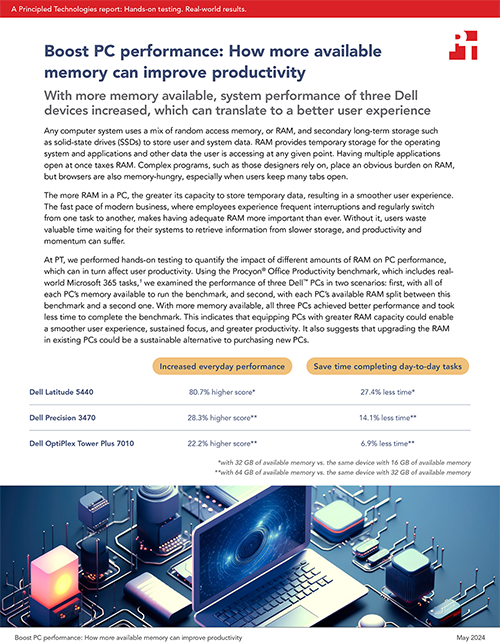
For business professionals navigating the fast-paced and often unpredictable workflows of the modern economy, a responsive PC that powers through chaotic days without a hitch can be a real lifeline. When workers spend much of the day jumping between online meetings, resource-hungry programs, office productivity apps, multi-tab browsing, and media streaming, they may push their system's memory to the limit and face slowdowns. More random access memory (RAM) can help boost a computer’s performance under heavy loads, but for buyers shopping for a new business laptop or workstation, it’s worthwhile to know how much of a difference additional memory can make to a system's performance in day-to-day tasks.
We used industry-standard benchmarks to measure the impact of different amounts of RAM on the performance of three PCs—a Dell Latitude 5440, a Dell Precision 3470, and a Dell OptiPlex Tower Plus 7010—in two test scenarios. In the first scenario, we ran the Procyon Office Productivity benchmark while allowing the PCs to take full advantage of all their available memory. In the second scenario, we looked at how the PCs might perform on the Procyon benchmark while we reserved 50 percent of each system’s memory for a simultaneous memory-hungry workload.
All three PCs achieved much better performance and took significantly less time to complete the Procyon benchmark in the first test scenario, when they had more available memory. These results indicate that equipping PCs with more RAM can be a worthwhile investment that could translate to users being able to complete workflows more quickly and multitask more efficiently.
To read more about our PC memory tests, check out the report below.
Principled Technologies is more than a name: Those two words power all we do. Our principles are our north star, determining the way we work with you, treat our staff, and run our business. And in every area, technologies drive our business, inspire us to innovate, and remind us that new approaches are always possible.






